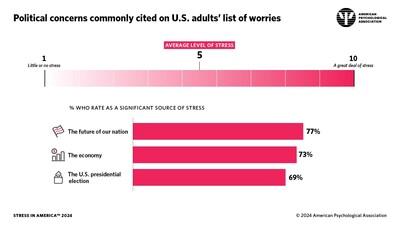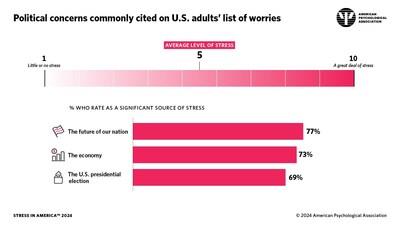
APA POLL: FUTURE OF NATION, ECONOMY AND PRESIDENTIAL ELECTION TOP U.S. STRESSORS
WASHINGTON, Oct. 22, 2024 /PRNewswire/ -- More than 7 in 10 adults said the future of the nation (77%) is a significant source of stress in their lives, with the economy (73%) and the 2024 U.S. presidential election (69%) following closely behind, according to the latest Stress in AmericaTM survey released today by the American Psychological Association.
At the same time, the poll found many common stressors among people with different political party affiliations. The survey was conducted by The Harris Poll on behalf of APA among more than 3,000 U.S. adults age 18+ between Aug. 1 and 23, 2024.
Continue ReadingPeople have faced a political climate that is highly charged, which has led to the erosion of civil discourse.
Post this
Political concerns commonly cited on U.S. adults' list of worries APA Stress in AmericaTM 2024
Compared with the previous two U.S. presidential elections, stress related to the election was similar to 2020 (69% vs. 68%) but significantly higher than in 2016 (52%). What sets the 2024 poll apart from previous APA election surveys is the collective stress about the potential fallout from the election results: More than 7 in 10 adults (72%) said they are worried the election results could lead to violence, and more than half of adults (56%) said they believed the 2024 presidential election could be the end of democracy in the U.S. Meanwhile, around a third of adults (32%) said the political climate has caused strain among themselves and their family members, with (30%) who said they limit their time with family because they don't share the same values.
"For nearly a decade, people have faced a political climate that is highly charged, which has led to the erosion of civil discourse and strained our relationships with our friends and our families. But isolating ourselves from our communities is a recipe for adding more stress to our lives," said APA CEO Arthur C. Evans Jr., PhD. "We must remember that the most extreme voices are often the loudest, and that the majority of adults share similar values and concerns."
Stress in AmericaTM 2024: A Nation in Political Turmoil
reveals a country where trust has been shaken in the government and in each other. Most adults (54%) reported they have very little to no trust in the U.S. government, and 41% of adults reported the state of the nation has made them consider moving to a different country. Half of adults (50%) said tension around social and political topics makes them less likely to want to connect with other people and around 3 in 10 (28%) said they have nothing in common with people who have different political opinions than they do. More than 2 in 5 adults (46%) wouldn't date someone who didn't share the same political opinions (47% of women said this, and 45% of men).
Yet the survey showed commonalities regardless of political party affiliation, with the future of the nation being the stressor that was most commonly rated as significant by Republicans (80%), Democrats (79%) and independents (73%). Further, Republicans, Democrats and independents agreed that the country's system of checks and balances isn't working (76% of Republicans, 71% of Democrats and 74% of independents). They also reported being stressed that politicians aren't talking about the things that are most important to them (62%, 58% and 60%, respectively), and that the political climate has caused strain between them and their family members (32%, 35% and 32%, respectively).
Mis- and disinformation have dialed up the volume on stress, as many adults (73%) reported it is stressful to know how real fake information can look or seem. A strong majority (82%) of U.S. adults were worried that people may be basing their values and opinions on false or inaccurate information.
Despite the pervasive stress about the nation's future and the fear of violence, this year's survey showcased how participants are using the political climate as a springboard for activism and driving positive change.
More than three-quarters of adults (77%) said they intend to vote in the presidential election, and half of adults (51%) said they feel more compelled to volunteer or support causes they value - significantly higher than the 45% who said so in 2019 during the lead up to the 2020 presidential election. Diverse communities in particular are being moved to act; 73% of Black adults and 67% of Latino/a/e adults reported feeling that their vote matters.
In addition, 3 in 5 adults reported feeling hopeful about the change this election will bring (61%), and that this election will lead to a more inclusive society (59%). More than 2 in 5 adults (42%) said they haven't felt this excited about an election in years. Significantly, although Black and Latino/a/e groups and those who identify as LGBTQ reported personal safety as a major stressor (47%, 47% and 50%, respectively), they have remained optimistic; 64% of Black and Latino/a/e adults reported feeling hopeful that the election could mean a more inclusive future.
"Stress surrounding the upcoming election seems overwhelming. But despite concerns about a nation divided across cultural identities and political parties, it's encouraging that hope could be the catalyst, where people can come together and have a stake in deciding their future," said Evans. "We see people's desire for positive change as an opportunity to channel our collective stress into meaningful conversations and actions that promote healing and understanding."
For more information on the survey findings and helpful resources on how to handle stress, go to .
METHODOLOGY
The 2024 Stress in AmericaTM survey was conducted online within the United States by The Harris Poll on behalf of the American Psychological Association between Aug. 1–23, 2024, among 3,305 adults ages 18+ who reside in the U.S. that serves as a nationally representative sample. In addition to the national sample, oversamples were collected to allow for subgroup analysis within race/ethnicity groups. Sample sizes across the national and oversamples are as follows: 801 Black, 855 Hispanic and 804 Asian. Interviews were conducted in English and Spanish.
Throughout the report, mentions of political parties are defined by those who self-identify as registered voters of the Democratic, Republican, or independent party.
A full methodology is available.
The American Psychological Association , in Washington, D.C., is the largest scientific and professional organization representing psychology in the United States.
APA's membership includes over 157,000 researchers, educators, clinicians, consultants and students. Through its divisions in 54 subfields of psychology and affiliations with 60 state, territorial and Canadian provincial associations, APA works to advance the creation, communication and application of psychological knowledge to benefit society and improve people's lives.
SOURCE American Psychological Association
WANT YOUR COMPANY'S NEWS FEATURED ON PRNEWSWIRE? 440k+Newsrooms &
Influencers 9k+
Digital Media
Outlets 270k+
Journalists
Opted In GET STARTED

Legal Disclaimer:
MENAFN provides the
information “as is” without warranty of any kind. We do not accept
any responsibility or liability for the accuracy, content, images,
videos, licenses, completeness, legality, or reliability of the information
contained in this article. If you have any complaints or copyright
issues related to this article, kindly contact the provider above.


















Comments
No comment